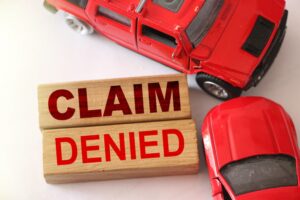Car accidents frequently occur when other drivers behave negligently at the wheel. However, for a variety of reasons, an insurance company may deny your claim for compensation. In that situation, you may need to consider several options, including litigation in the state court system.
A car accident attorney in your area can go over your options with you and help you select the best course of action for your case in pursuit of the financial compensation you need.
Table Of Content
Car Accident Causes and Injuries
 Car accidents resulting from someone else’s negligence can happen in a variety of ways. One common cause is distracted driving, where drivers divert their attention from the road due to activities like texting, talking on the phone, or using in-car entertainment systems. This negligence can lead to collisions, as distracted drivers may fail to notice traffic signals, stop signs, or other vehicles in the vicinity.
Car accidents resulting from someone else’s negligence can happen in a variety of ways. One common cause is distracted driving, where drivers divert their attention from the road due to activities like texting, talking on the phone, or using in-car entertainment systems. This negligence can lead to collisions, as distracted drivers may fail to notice traffic signals, stop signs, or other vehicles in the vicinity.
Reckless or aggressive driving is also a significant cause of car accidents. Tailgating, aggressive lane changes, and failing to yield the right-of-way can result in collisions and jeopardize the safety of other road users. Aggressive driving behaviors often lead to accidents with severe and sometimes deadly consequences.
Speeding is another common factor that contributes to car accidents. Driving above the posted speed limits or too fast for prevailing weather conditions reduces a driver’s ability to react promptly to obstacles, increasing the severity of accidents. Speed-related accidents can involve side-impact collisions, rear-end collisions, or even rollovers.
Driving under the influence of alcohol or drugs is also a major cause of local accidents. Impaired drivers have reduced reaction times, impaired judgment, and compromised coordination, making them more likely to cause accidents. Drunk or drugged driving accidents often result in serious injuries and fatalities – especially when they occur at high speeds.
Failing to obey traffic signals and signs is another common form of negligence. Drivers who run red lights, disregard stop signs, or fail to yield the right-of-way at intersections contribute to accidents, especially those involving broadside or T-bone collisions.
The most common injuries that victims may suffer in car accidents vary in severity:
- Whiplash is a frequent injury that results from the sudden back-and-forth movement of the accident victim’s head upon impact. It can lead to muscular stiffness, pain, and ongoing migraines.
- Bone fractures are also common in car accidents, affecting the arms, wrists, legs, ankles, ribs, or pelvis.
- Soft tissue injuries, such as muscular strains or ligament sprains, often lead to pain, swelling, and restricted movement.
- Psychological injuries, like post-traumatic stress disorder (PTSD), can affect the accident victim long after they have recovered from their physical injuries.
- Traumatic brain injuries (TBIs) occur when the accident victim’s head sustains a forceful blow or jolt. TBIs range from concussions and comas to other severe injuries, often affecting cognitive functions, memory, and behavior.
- Spinal cord injuries can result in paralysis, loss of sensation, or mobility issues.
If you suffered any of these injuries in a recent car crash due to another driver’s negligence, you should focus your attention on getting the medical treatment that you need. In the meantime, an experienced car accident lawyer can handle the legal aspects of your case and pursue the compensation you deserve.
Reasons Why a Car Insurance Company May Deny a Claim
 Car insurance companies may deny a car accident claim for various reasons, which can be important for individuals to understand. One common reason is a lack of coverage. If the policy doesn’t cover specific types of accidents – or the driver exceeds their coverage limits – the insurance company may deny the claim.
Car insurance companies may deny a car accident claim for various reasons, which can be important for individuals to understand. One common reason is a lack of coverage. If the policy doesn’t cover specific types of accidents – or the driver exceeds their coverage limits – the insurance company may deny the claim.
Failing to report the accident promptly can also lead to claim denials. Insurance policies typically require timely reporting of accidents. If a driver waits too long to notify the insurance company, it may be grounds for denial. Reporting the accident promptly allows the insurance company to investigate efficiently and assess the damages accurately.
Misrepresentation or providing inaccurate information can also create the basis for a claim denial. If the driver provides false details about the accident, their driving history, or other relevant information, the insurance company may reject the claim. Honest and accurate reporting is essential for a smooth claims process.
Moreover, exclusion clauses in the insurance policy outline specific scenarios not covered by the policy. If the accident falls within these excluded categories, the insurance company has grounds to deny the claim. Drivers should carefully review their policy to understand any exclusions that may apply to their situation.
A significant factor leading to claim denials is a determination of fault. If the insurance company concludes that the policyholder was at fault for the accident, they may deny the claim or reduce the payout amount. Clear evidence and documentation are essential to establish fault and support the claim.
Policy lapses or non-payment of premiums can also result in claim denials. If the policyholder fails to pay premiums on time or allows their coverage to lapse, the insurance company may deny any claims made during the period without coverage. Maintain continuous coverage to ensure that insurers process and honor your claim.
Filing a claim for pre-existing damage or unrelated issues may also lead to a denial. Insurance covers damages resulting from accidents or unforeseen events, not pre-existing conditions or unrelated damages. Claiming unrelated issues can result in denial and potential consequences for the policyholder.
Understanding these potential reasons for claim denial emphasizes the importance of responsible and accurate reporting, maintaining continuous coverage, and adhering to policy terms and conditions.
Drivers should regularly review their insurance policies, promptly report accidents, and provide honest and precise information to avoid claim denials.
Your Legal Options if the Insurance Company Denies Your Claim
If a car insurance company denies your claim, you may have several potential legal options to explore. One course of action is to dispute the denial directly with the insurance company. Your lawyer can provide additional evidence, such as witness statements, photos, or accident reports, to support your claim.
Hire a car accident lawyer to communicate clearly and persistently with the insurance company, seeking prompt clarification on the reasons for the denial and addressing those issues in your response.
If a direct dispute doesn’t resolve the matter, you can file a complaint with your state’s insurance regulatory authority. This government agency oversees insurance companies and ensures that they operate fairly.
Submitting a complaint may prompt the insurance company to reevaluate your claim and provide a more thorough explanation for the denial. The regulatory authority may intervene to mediate or assist in reaching a resolution.
In some cases, hiring an experienced attorney may be necessary to pursue legal action against your insurance company. An attorney can review the denial, assess the merits of your case, and advise on the best course of action.
They may send a demand letter to the insurance company, outlining the reasons why the denial is unjust and requesting a reconsideration. If this doesn’t lead to a satisfactory outcome, your attorney can file a lawsuit against the insurance company.
Another legal option is to explore alternative dispute resolution (ADR) methods. Mediation is a form of ADR where a neutral third party steps in and helps facilitate discussions between you and the insurance company to reach a resolution. Binding arbitration is a more formal ADR process where an arbitrator makes a binding decision after reviewing the evidence that both parties present. Both mediation and arbitration can offer quicker and less formal alternatives to a full-blown court trial.
In situations where the denial is based upon bad faith or unfair practices, you may consider filing a bad faith insurance claim. This legal action alleges that the insurance company did not fulfill its obligation to act in good faith and deal fairly with your claim. If successful, a bad faith claim can lead to compensation beyond the original claim amount.
Understanding these legal options empowers you to take appropriate steps if your car insurance claim is denied. Consulting a knowledgeable car accident attorney and being persistent in addressing the denial can navigate the complexities of the claims process and seek a fair resolution for your car accident-related damages.
What Happens During Car Accident Litigation?
 After an insurance company denies your car accident claim, the next step may involve pursuing car accident litigation to seek compensation through legal proceedings.
After an insurance company denies your car accident claim, the next step may involve pursuing car accident litigation to seek compensation through legal proceedings.
The litigation process involves several key stages.
- Promptly consulting a lawyer – One of the first steps is seeking legal representation. Consult an attorney experienced in personal injury and car accident cases. An attorney can assess the denial, gather evidence, and determine the feasibility of a lawsuit.
- Filing a Lawsuit – If pursuing litigation is deemed appropriate, your attorney will file a timely lawsuit against the at-fault party. This initiates formal legal proceedings and officially brings the matter to court.
- Discovery Phase – The discovery phase follows the filing of a lawsuit. During this stage, both parties exchange information and evidence relevant to the case. This includes witness statements, accident reports, medical records, and any other documentation supporting each side’s claims.
- Depositions – Depositions involve sworn, out-of-court testimony by involved parties and witnesses. Attorneys question individuals under oath, and the responses are recorded. Depositions provide an opportunity to gather additional information and assess the strength of each side’s case.
- Settlement Negotiations – Settlement negotiations may occur throughout the litigation process. Both parties, along with their attorneys, may engage in discussions to reach a resolution before going to trial. Settlements can help avoid the time and expenses associated with a full trial.
- Mediation or Alternative Dispute Resolution (ADR) – If settlement negotiations are unsuccessful, the court may require or suggest mediation or other forms of ADR. Mediation involves a neutral third party supervising settlement discussions between the parties to find a mutually agreeable resolution.
- Trial – If a resolution is not reached through settlement negotiations or ADR, the case proceeds to trial. Both parties present their arguments, evidence, and witness testimony in front of a judge and, in some cases, a jury. The judge or jury then determines liability and damages.
Understanding these stages of car accident litigation provides insight into the process following the denial of an insurance claim. Seek legal guidance to navigate these complexities and pursue fair compensation for car accident-related damages.
Recoverable Financial Compensation in a Car Accident Case
If you sustain injuries in a car accident, you may receive damages to compensate for the physical, emotional, and financial toll on your life.
Your lawyer can explain these potential damages when seeking compensation through a legal claim:
- Medical Expenses – This includes reimbursement for all past and future medical costs related to the car accident. It covers hospital bills, surgeries, medications, rehabilitation, and any other necessary treatments.
- Lost Wages – If your injuries result in missed work days or a diminished ability to earn income, you may receive compensation for the income you lost during your recovery period. This encompasses both past and anticipated future earnings.
- Pain and Suffering – These damages address the physical and emotional distress resulting from the car accident. Compensation aims to alleviate the pain, anxiety, and overall reduction in the quality of life due to your injuries.
- Mental Anguish – If the accident leads to psychological consequences, such as anxiety, depression, or post-traumatic stress disorder (PTSD), you may be entitled to compensation for mental anguish.
- Loss of Consortium – This category extends to spouses or family members. It addresses the loss of care, companionship, and emotional support resulting from the injuries suffered in the collision.
- Permanent Disfigurement or Disability – If the accident results in lasting physical changes or disabilities, this compensation aims to address the effect of visible scarring, disfigurement, or long-term limitations.
- Loss of Enjoyment of Life – This damage category recognizes the limitations imposed on a car accident victim’s ability to enjoy life as they did before the collision. It covers the loss of activities, hobbies, or experiences due to various injuries.
- Loss of Use of a Body Part – If the accident causes the partial or complete loss of function in a specific body part, this compensation addresses the challenges and limitations associated with the loss of use.
- Punitive Damages – In rare cases involving extreme negligence or intentional misconduct, the court may award punitive damages. These punish the at-fault party and deter similar behavior in the future.
Talk with a Knowledgeable Car Accident Lawyer in Your Area Today

Russell Reiner, Car Accident Attorney
If you recently sustained injuries in a car accident – and the insurance company denied your claim – you may have legal options.
A skilled personal injury attorney in your jurisdiction can explore your available options, including litigation in court, and take the necessary steps to pursue the compensation you deserve.
